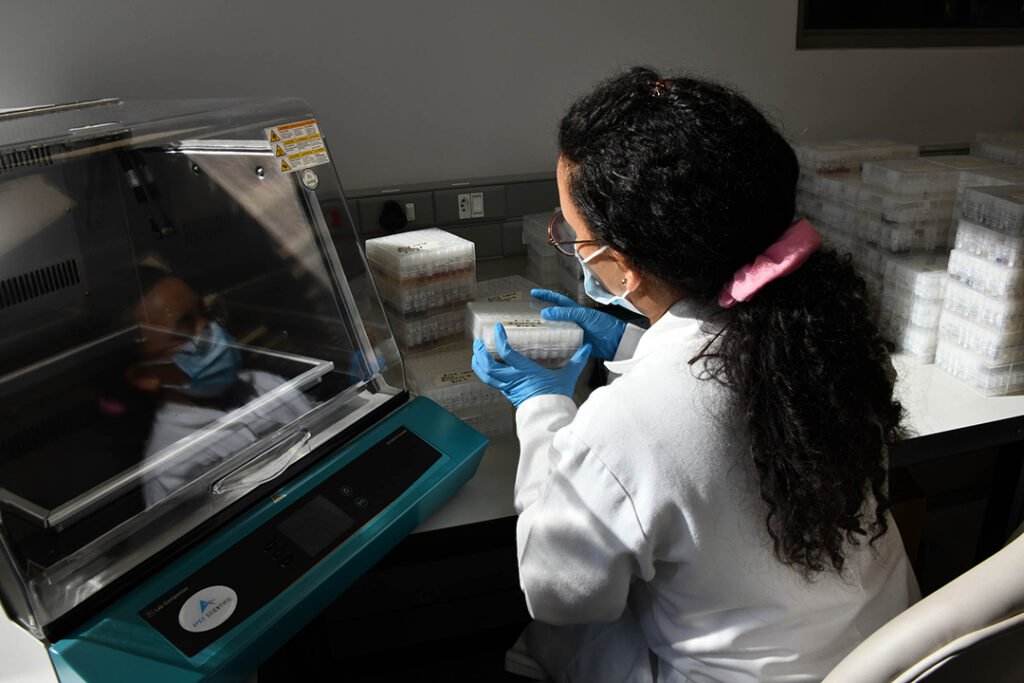ADF STAFF
More than 11 million people across Africa have survived a COVID-19 infection since the beginning of the pandemic. But that does not mean they’re safe from the virus forever.
Researchers at Stellenbosch University in South Africa have found COVID-19 can reinfect people multiple times as the virus produces new and different variants and sublineages through mutation. The omicron variant, in particular, has proven itself especially capable of overcoming either natural or acquired immunity.
With an estimated 98% of South Africans showing some form of immunity to COVID-19, the research led by Juliet Pulliam, director of Stellenbosch’s South African Centre for Epidemiological Modelling and Analysis, suggests COVID-19 will become a regular part of many people’s lives going forward.
“This finding has important implications for public health planning, particularly in countries such as South Africa, with high rates of immunity from prior infection,” Pulliam wrote in the study published this year after the first wave of omicron infections.
Previous waves driven by the beta and delta variants failed to produce large numbers of reinfections. The omicron variant, which started in late 2021, caught scientists’ attention because people who had already recovered from those earlier waves were coming down with COVID-19 infections a second, third or even fourth time.
Omicron substantially increased the risk of reinfection, Pulliam said.
“Recent reinfections have occurred in individuals whose primary infections occurred across all three waves, with the most having their primary infection in the delta wave,” Pulliam wrote on Twitter in December.
Research published recently by the United Kingdom’s Office for National Statistics found the risk of becoming reinfected with an omicron variant was eight times greater than the risk of being reinfected by the delta variant. Travelers were more likely to report reinfections than those who stayed home.
Other studies of the omicron variant have found that the older someone’s immunity is, the greater the likelihood they will be reinfected by omicron.
“The virus has changed a lot,” Aubree Gordon, an infectious disease epidemiologist at the University of Michigan, told Wired magazine. The changes omicron has developed make it difficult for the body’s immune system to recognize it and fight back, she added.
Following the omicron wave, a study by the South African National Blood Service found that 98% of South Africans have some level of immunity to COVID-19, the vast majority from direct exposure to infection.
The original omicron wave, identified as B.1.1.529, spun off multiple new variants, including the BA.4 and BA.5 strains that drove South Africa’s fifth wave in April and May.
While reinfections are possible due to omicron, they have been rare to this point. According to Pulliam’s research, reinfections accounted for about 15% of current infections in South Africa — a figure she concedes is underestimated because testing has dropped off sharply.
“We probably missed a lot of people’s first infections,” Pulliam told Wired.
Continentwide, testing for COVID-19 fell 28% in early June, according to the Africa Centres for Disease Control and Prevention. That was despite rising case numbers that prompted Kenya to declare a sixth wave of infections.
Overall, infections are increasing in all regions of Africa except Southern Africa, where the end of South Africa’s fifth wave has caused numbers to decline.
Even as South Africa’s infection numbers fall, the omicron variant’s ability to overcome immunity is a reminder of what the future may hold when it comes to fighting COVID-19, according to Pulliam.
“When the pandemic first started, everybody assumed that once you got it, you were done,” Pulliam told Wired. “If what’s going on in South Africa is any indication, it’s that probably people are going to be reinfected over the course of years.”

